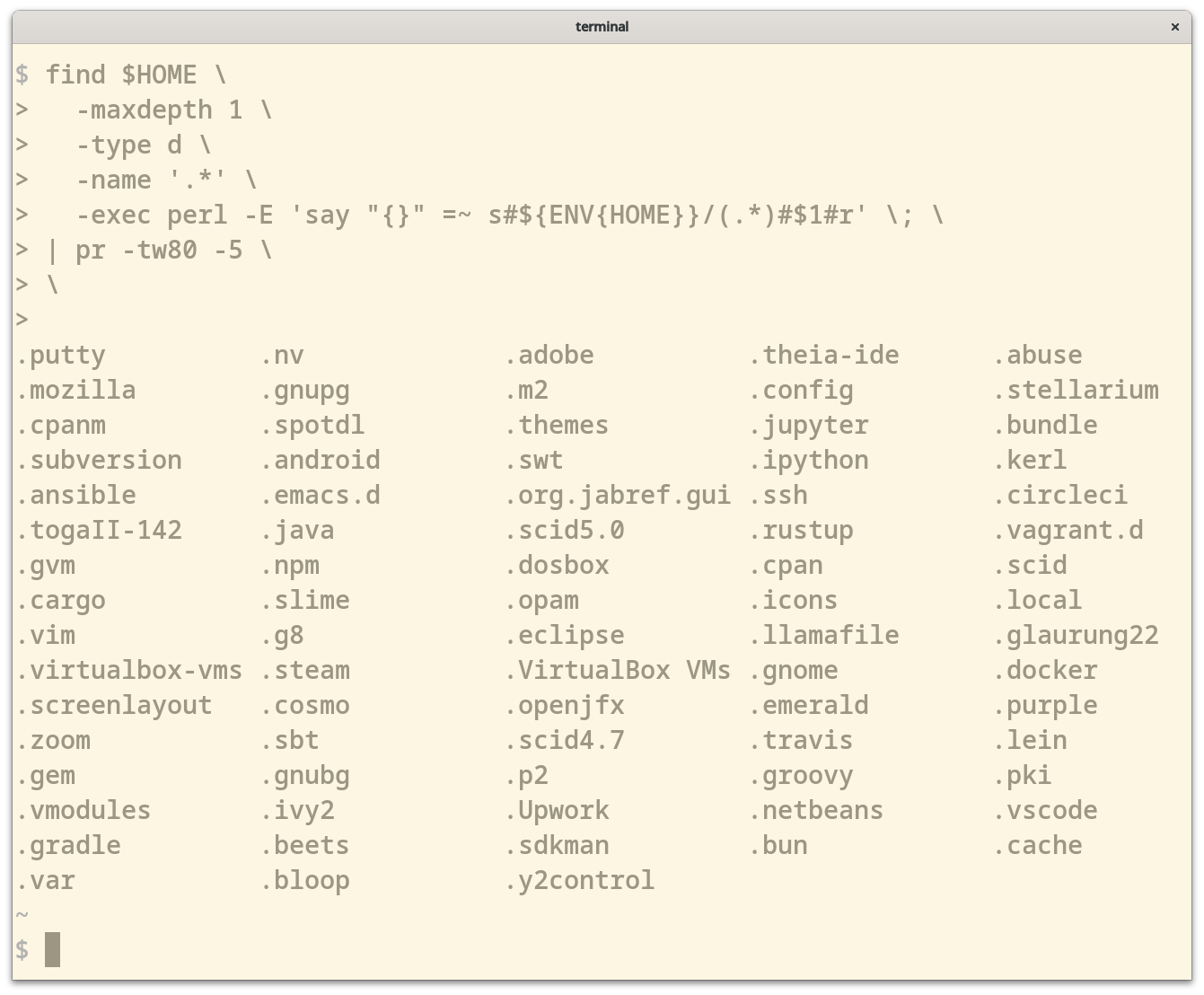bahmanm
Husband, father, kabab lover, history buff, chess fan and software engineer. Believes creating software must resemble art: intuitive creation and joyful discovery.
Views are my own.
- 19 Posts
- 26 Comments
I didn’t like the capitalised names so configured xdg to use all lowercase letters. That’s why
~/optfits in pretty nicely.You’ve got a point re
~/.local/optbut I personally like the idea of having the important bits right in my home dir. Here’s my layout (which I’m quite used to now after all these years):$ ls ~ bin desktop doc downloads mnt music opt pictures public src templates tmp videos workspacewhere
binis just a bunch of symlinks to frequently used apps fromoptsrcis where i keep clones of repos (but I don’t do work insrc)workspaceis a where I do my work on git worktrees (based offsrc)
Thanks! So much for my reading skills/attention span 😂
Which Debian version is it based on?
RE Go: Others have already mentioned the right way, thought I’d personally prefer
~/opt/goover what was suggested.
RE Perl: To instruct Perl to install to another directory, for example to
~/opt/perl5, put the following lines somewhere in your bash init files.export PERL5LIB="$HOME/opt/perl5/lib/perl5${PERL5LIB:+:${PERL5LIB}}" export PERL_LOCAL_LIB_ROOT="$HOME/opt/perl5${PERL_LOCAL_LIB_ROOT:+:${PERL_LOCAL_LIB_ROOT}}" export PERL_MB_OPT="--install_base \"$HOME/opt/perl5\"" export PERL_MM_OPT="INSTALL_BASE=$HOME/opt/perl5" export PATH="$HOME/opt/perl5/bin${PATH:+:${PATH}}"Though you need to re-install the Perl packages you had previously installed.

 3·1 year ago
3·1 year agoThis is fantastic! 👏
I use Perl one-liners for record and text processing a lot and this will be definitely something I will keep coming back to - I’ve already learned a trick from “Context Matching” (9) 🙂
That was my case until I discovered that GNU tar has got a pretty decent online manual - it’s way better written than the manpage. I rarely forget the options nowadays even though I dont’ use
tarthat frequently.
TBH I use whatever build tool is the better fit for the job, be it Gradle, SBT or Rebar.
But for some (presumably subjective) reason, I like GNU Make quite a lot. And whenever I get the chance I use it - esp since it’s somehow ubiquitous nowadays w/ all the Linux containers/VMs everywhere and Homebrew on Mac machines.

 7·1 year ago
7·1 year agoThat single line of Lisp is probably
(defmacro generate-compiler (...) ...)which GCC folks call every time they decide to implement a new compiler 😆
😆Can someone make a similar one for bluetooth devices too, pretty please?

 12·1 year ago
12·1 year agoI agree w/ you RE posts looking horrible 👍
Though I’d say for one-liners like this, it’s mostly OK. It gets really messy when folks post more complex posts and mention and tag a bunch of times.

 1·1 year ago
1·1 year agoAny error logs? Try launching things from the terminal and note down any messages that are printed there.

 41·1 year ago
41·1 year agoThat’s a good question 💯 In my case too, it took me some time (read years 😂) to figure out what I’m comfortable w/.
I can think of 3 major ways that you can navigate the filesystem while being able to drop to a shell when you need it:
- If you’re familiar w/ Emacs, you can either:
- Use
diredandtrampon your machine to access/navigate the target machine. - Install Emacs (
emacs-nox) on the target machine, SSH and then runemacs-noxand voila! No need fortrampin this scenario.
- Use
- Use Midnight Commander (
mc) which offers a TUI pretty much like Norton Commander (nc) from the days of yore. - Get used to the semi-standard structure of the file system and just use plain Bash (
cd,pushd&popd) to move around. That is- Understand what usually goes into common directories (like
/usr/shareor/opt) and try to follow the same pattern when rolling your own software installations. - Learn how to use your distro’s package manager to query packages and find out where things, like configurations and docs, are stored. Something as simple as
rpm -q --listis what you usually need.
- Understand what usually goes into common directories (like
HTH
- If you’re familiar w/ Emacs, you can either:

 7·1 year ago
7·1 year agomessing with the partition any more than I already have
Running
fsckis a harmless and actually pretty useful operation, esp if you boot using a USB stick.But yes, never hurts to have backups - easier said than done 😂

 62·1 year ago
62·1 year agoI’m not on a Debian-based system but a recent experience w/ packaging a software as a DEB was quite eye-opening 😅 The format and the build process felt too cluttered (to me) and it wasn’t easy for me to wrap my head around it.
I’m happy that folks are working on alternatives ✌️

 7·1 year ago
7·1 year agoHave you tried booting into recovery mode and perform a
fsckon the drive - using the grub menu? Or you could boot via USB and try the procedure.
I wanted to say “I’m not sure. I’m not on Ubuntu” but then I remembered about distrobox 😄
It took only a few minutes to confirm that the links I shared earlier (https://lemmy.ml/comment/3090571) do NOT install the snap version.
Would it make sense to stick to the good old DEB package instead of the snap then?
The Mozilla Team PPA seems to be legit. If you’re not sure how to do it, please take a look at OMGI Ubuntu guide which uses the same PPA.
Not an Ubuntu user, but I think it’s all about how a snap uses filesystem, esp directories which are not writable by the “world”, such as your home directory.












Thanks for the pointer! Very interesting. I actually may end up doing a prototype and see how far I can get.